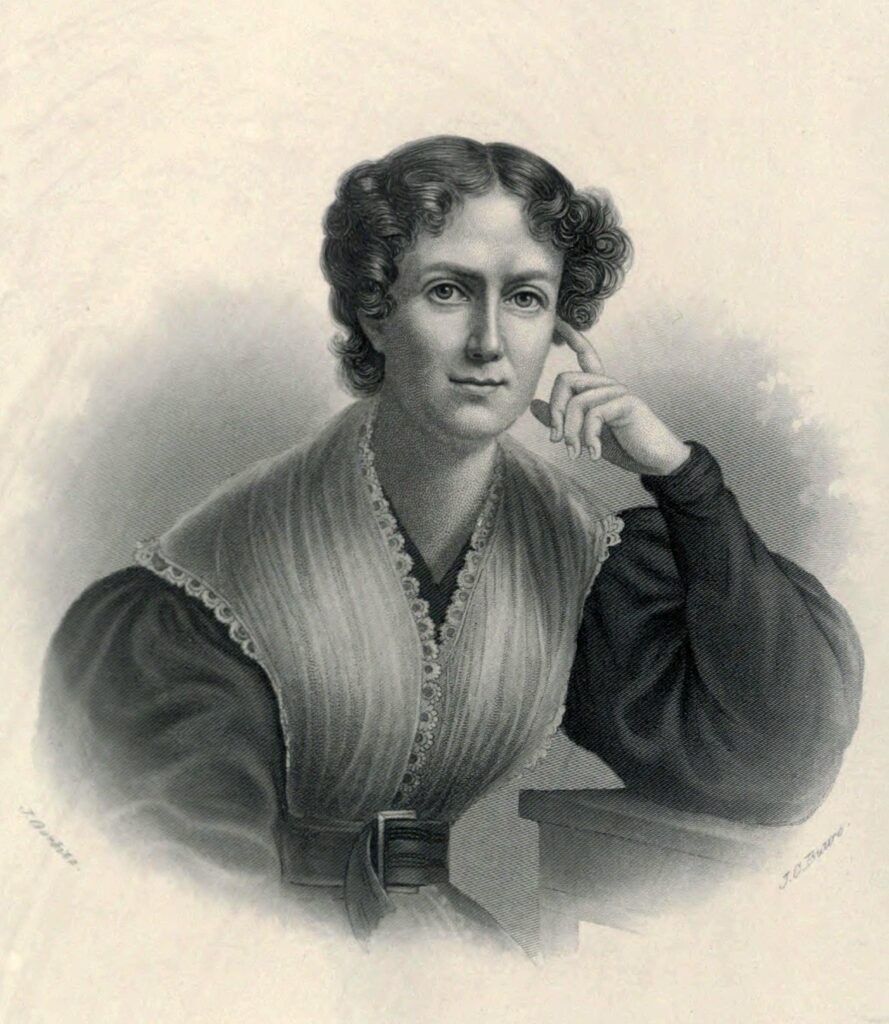“Equality is the soul of liberty; there is, in fact, no liberty without it.”
Frances Wright
On this day in 1795, Frances Wright was born in a newly built house at 136 Nethergate in Dundee, Scotland. The daughter of a wealthy linen manufacturer – a growing industry thanks to the new industrial revolution – Frances might have been predisposed to political radicalism. Her father corresponded with Adam Smith, “The Father of Capitalism” who advocated for rational self-interest and divisions of labor, and Thomas Paine, an American whose pamphlets had been some of the most influential in spurring on the American Revolution.
However, Frances was orphaned by the age of two. Frances and her sister, Camilla, were left a substantial inheritance and raised in England by their maternal aunt. At age 16, Frances returned to Scotland to live with her great-uncle James Mylne, a philosophy professor, under whom she continued self-study of the Greek philosophers. Frances’s interest must have been long-standing – and potentially evident of a childhood filled with books and learning – as Greek philosopher Epicurus was the subject of her first book, A Few Days in Athens, which she completed at the age of eighteen in 1813 (but published in 1822).

At 23 years old, Frances and Camilla reunited and traveled to the United States. They toured for two years, during which Frances’s play Altorf was anonymously produced and performed in New York City and Philadelphia. Once back in England, Frances published her memoirs of the trip as Views of Society and Manners in America (1821), which predated other early descriptions of American life (such as the more well known Alexis De Tocqueville’s Democracy in America), and garnered an invitation to join the intellectual circle of philosopher and social reformer Jeremy Bentham. Her Views was translated into several languages and widely read throughout Europe.
“Here, then is the great beauty of American government. The simple machinery of representation carried through all its parts, gives facility for its being moulded at will to fit with the knowledge of the age. If imperfect in any or all of its parts, it bears within it a perfect principle — the principle of improvement. And, let us observe, that this principle is all that we can ever know of perfection.
Frances Wright
[…]
The clear-sighted provision in the national constitution, as in the constitutions of the different states, by which the frame of government can be moulded at will by the public voice, and so made to keep pace in progress with the public mind, is the master-stroke in constitutional law. Were our institutions far less enlightened and well digested than they are — were every other regulation erroneous, every other ordinance defective — nay, even tyrannous — this single provision would counterbalance all.”
Bentham introduced Frances to economists, politicians, writers, and reformers, many of whom opposed religious clergy. Her new connections enabled Frances to continue traveling, with an invitation to visit Paris in 1821 from the Marquis de Lafayette. Despite the age difference, the two became good friends. Frances accompanied Lafayette on his farewell tour of America – during which she made acquaintances with three Presidents and became exposed to Utopian communities of Pennsylvania and Indiana. Francis chose to stay in the United States, forming her own utopian community in Nashoba, Tennessee, for a time.
These friendships and travels were integral to Frances’s writings, which advanced the causes of feminism and equality in education. She also advocated for birth control, sexual freedom, divorce laws, and the emancipation of slaves. Her views were published in The New Harmoney and Nashoba Gazette beginning in the late 1820s (later called the Free Enquirer); by the 1830s, Frances was also speaking publicly and lecturing on women’s suffrage, becoming the first woman to deliver public lectures to men and women on political social reform issues in the Untied States. Her lectures were so popular that groups throughout the eastern and midwestern United States established “Fanny Wright societies” to promote her works and foster like-minded talks. In 1829, the Working Men’s Party was so supportive that they called its slate of candidates the “Fanny Wright ticket.”
Most of her speeches were published Course of Popular Lectures (1829 and 1836).
“All that I say is, examine, inquire. Look into the nature of things. Search out the grounds of your opinions, the for and against. Know why you believe, understand what you believe, and possess a reason for the faith that is in you.”
Frances Wright
Frances married a French physician in 1831 and had one daughter. The couple traveled between Europe and the United States, eventually settling in Cincinnati, Ohio. Frances published her final book in 1848, facing declining health and a fracturing marriage. The couple divorced in 1850, followed by a lengthy battle over custody of their daughter and Frances’s wealth. The battle estranged Frances from her daughter. The legal proceedings remained unsettled when Frances died on December 13, 1852, from complications of a broken hip after falling on ice outside her home.
-Tiffany Isselhardt
Program Developer
